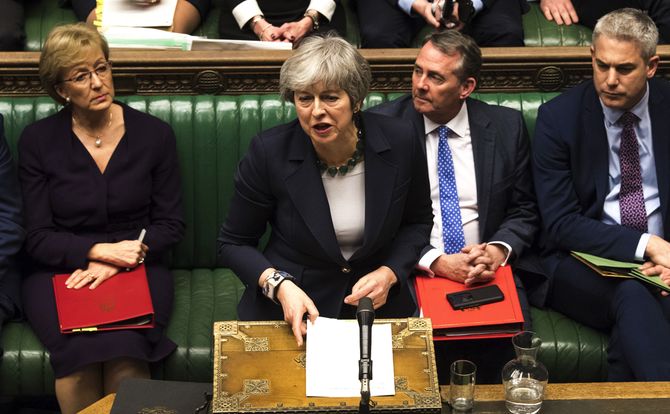Theresa May and the continental side of Brexit
British Prime Minister Theresa May is taking the blame for a debacle that is not of her making. But even now, in the shadow of a hard Brexit, the damage can be contained if cooler heads prevail on the other side of the Channel.

These days one has to admire Prime Minister Theresa May. After the Brexit referendum, most of the major players, Brexiteers and Remainers alike, vanished from London’s political stage. Ms. May soldiered on, even though she inherited an impossible situation.
The referendum result forced her to lead the United Kingdom – against her own wishes – out of the European Union. Duty toward her country drove the prime minister to seek the best solution possible, pitting her against an inflexible negotiating team from Brussels, but also against an unruly parliament in Westminster.
In hindsight, it appears that Ms. May erred by calling an election so soon after taking office, fatally weakening her Conservative majority. Now, however, it might be a blessing that the forthcoming election campaign will not coincide with the Brexit date.
The situation in London is bizarre, to put it mildly. The prime minister keeps winning votes of confidence – quite justifiably – while losing time after time on her EU agreements, which are essential to reorganize relations with the bloc and soften the transition. Ms. May is opposed by elements within her own party, but also by the Labour opposition, who irresponsibly dream of new elections.
The prime minister offered her resignation as the price for acceptance of the treaty, but that did not work, either.
On the surface, the situation in Brussels and the key continental capitals, Berlin and Paris, appears more normal. The prevailing view toward their British partners is a principalist “take it or leave it.” Fortunately, a certain willingness to extend the negotiating period can be detected. But for a long time, the pretense was maintained that Brexit was purely a British problem and that any misfortune befalling the UK would only be its just deserts.
A certain resigned calm seems to have descended on London, while across the Channel anxiety is mounting.
This rather schizophrenically ignored the damage Brexit would inflict on companies and job markets all over Europe, even as economists pretended that it could be a factor slowing the entire world economy – an exaggeration in the global context.
In recent days, however, a certain resigned calm seems to have descended on London, while across the Channel anxiety is mounting, at least in Germany. Two months ago, a group of top politicians and business people wrote an open letter to the people of the UK, stressing their love for Britain and pleading for it to remain. Otherwise, they said, the damage could be severe. For the first time, the Ministry of Economy in Berlin warned that a hard Brexit might lead to the loss of German jobs.
GIS has repeatedly stressed that Brexit needs to be handled in a pragmatic fashion. The divorce has the potential to inflict as much damage on the EU as on Britain, unless the exit agreements result in a free exchange of goods, capital and services between the two sides, as well as a satisfactory resolution to the movement of people.
A hard Brexit looks increasingly likely. Perhaps this shock is needed for both sides to adopt a more realistic approach and negotiate mutually beneficial agreements. Theresa May’s political career might not survive this process, but she should nevertheless be given much of the credit for its outcome. The new arrangements will likely be based upon her efforts.
